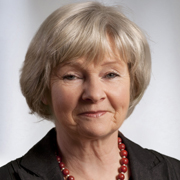Wickman-Parak: The IMF’s role – new thinking in the wake of the financial crisis
On Friday, Deputy Governor Barbro Wickman-Parak delivered a speech at the Global Challenge Stockholm. She spoke about the role of the International Monetary Fund (IMF) in the surveillance of global financial stability. She pointed to the problem that there is no international organisation that has an explicit responsibility for conducting surveillance of the global financial system as a whole, warning of risks and giving recommendations on how these risks could be counteracted.
 "In this context, the IMF has a unique analytical capacity and knowledge about its member countries that few other organisations can compete with," noted Ms Wickman-Parak. "In addition, given its almost global membership, the IMF also has the legitimacy needed to gain a hearing for its advice, recommendations and decisions," added Ms Wickman-Parak. Ms Wickman-Parak also advocated that the IMF should be able to play a more active role in macroprudential policy by systematically compiling, analysing and providing information about lessons learned in different countries and regions.
"In this context, the IMF has a unique analytical capacity and knowledge about its member countries that few other organisations can compete with," noted Ms Wickman-Parak. "In addition, given its almost global membership, the IMF also has the legitimacy needed to gain a hearing for its advice, recommendations and decisions," added Ms Wickman-Parak. Ms Wickman-Parak also advocated that the IMF should be able to play a more active role in macroprudential policy by systematically compiling, analysing and providing information about lessons learned in different countries and regions.
"The notion that the global financial system was largely invulnerable was firmly refuted by the outbreak of the financial crisis in 2007. The crisis clearly demonstrated that surveillance of the global financial system was inadequate – and one of the reasons for this was an unclear division of roles between various international bodies," noted Ms Wickman-Parak.
Ms Wickman-Parak also said that the IMF has been criticised because the organisation failed to warn of the risks that developed in the financial system before the crisis began. However, in the years following the crisis the IMF has made progress and improved its analysis of the financial sector, for example by integrating the analysis of financial stability with the traditional macroeconomic analysis of the member countries. But much remains to be done, and Sweden and the Riksbank have every reason to support the IMF in this work. "The IMF is an institution that is well equipped to perform an independent and stringent analysis of the international financial system," stated Ms Wickman-Parak.
You can read the entire speech in the PDF file.